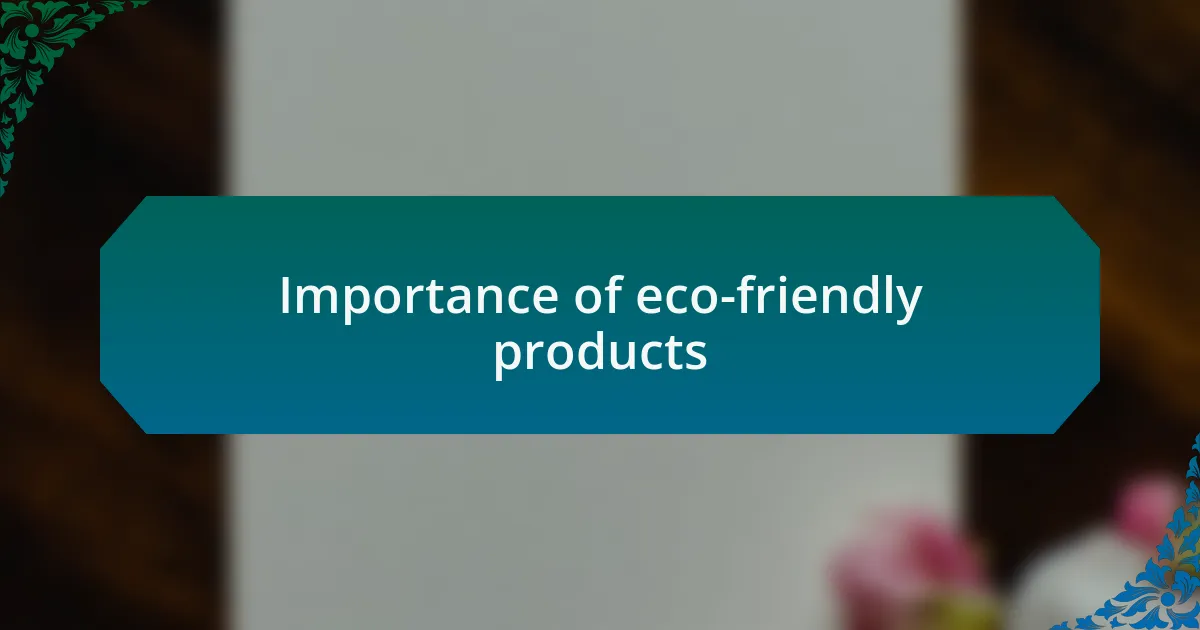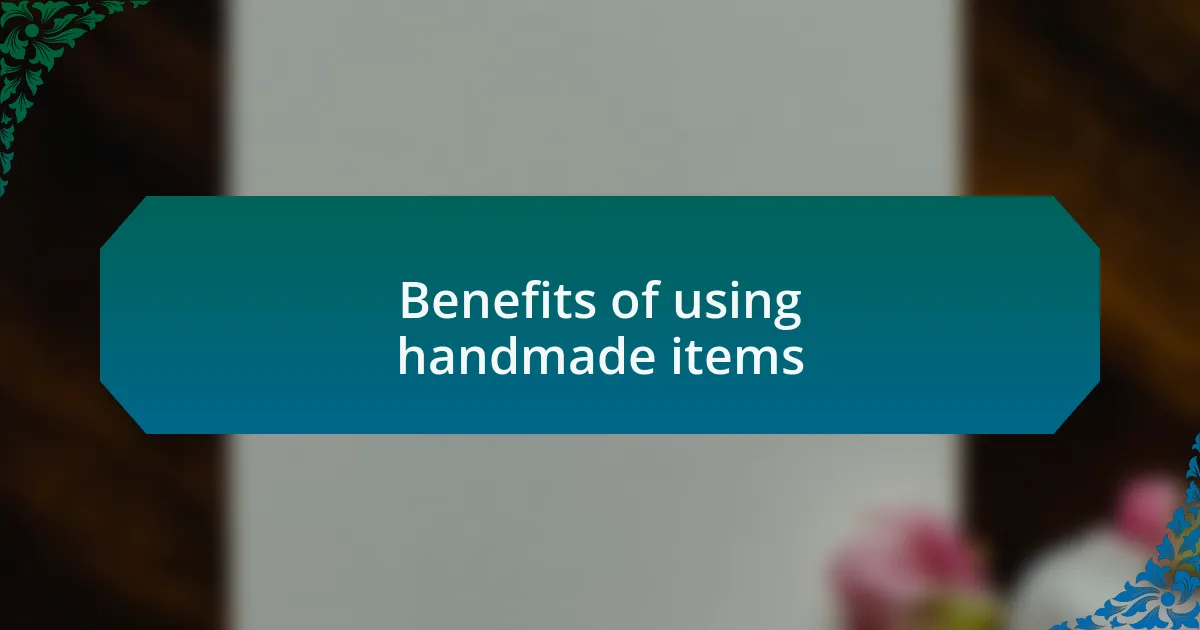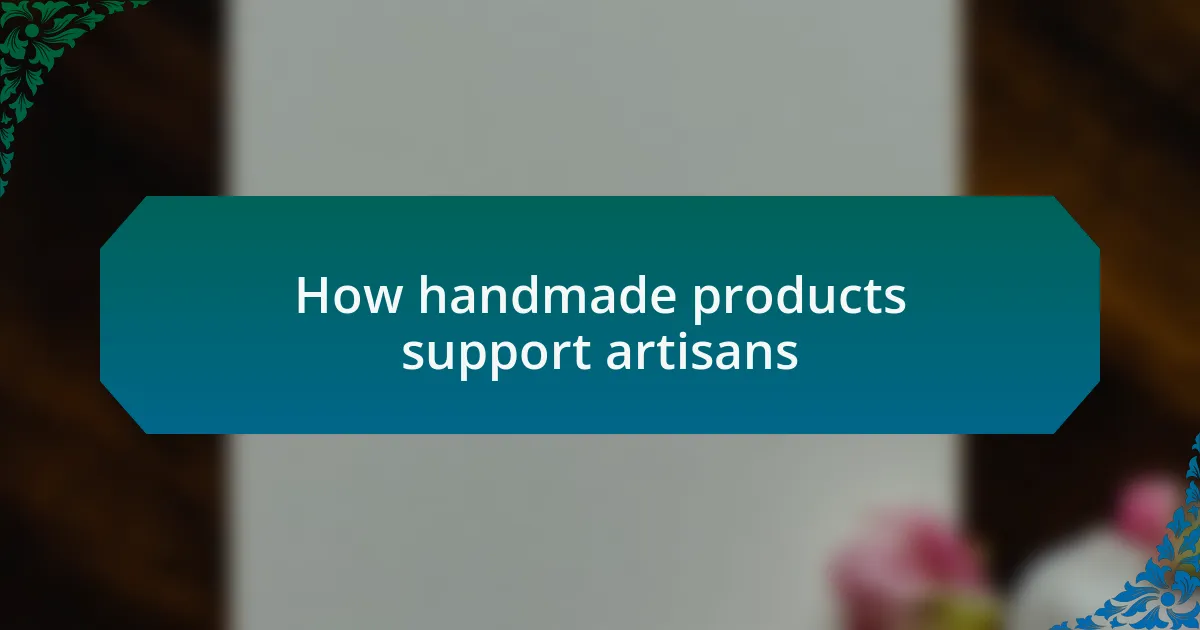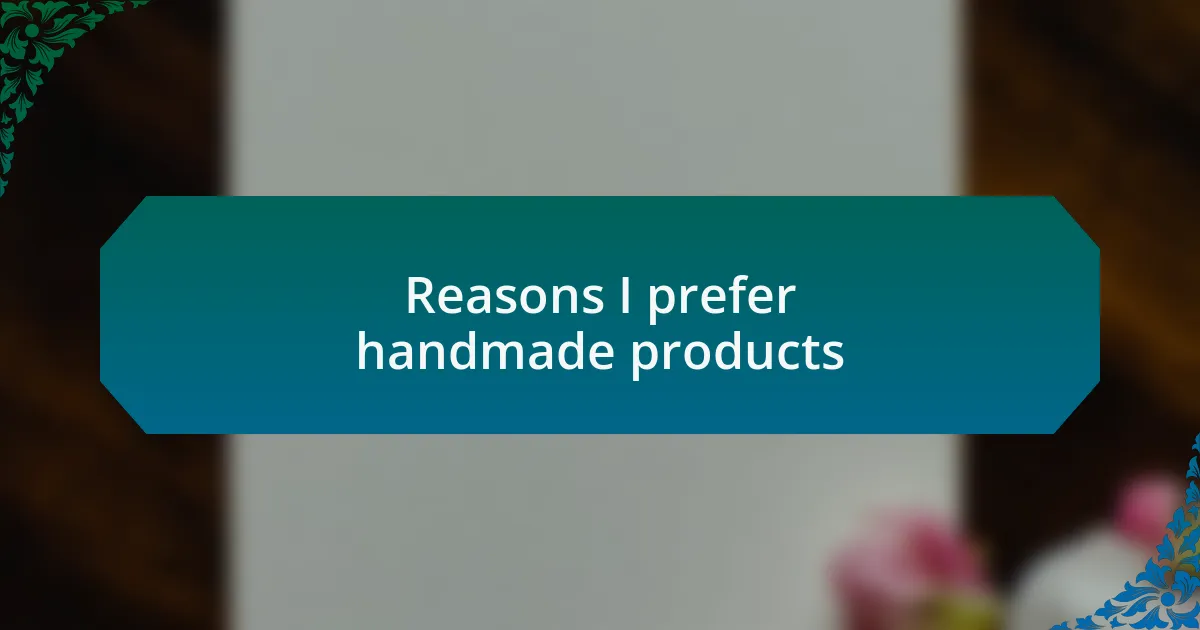Key takeaways:
- Handmade home goods offer unique artistry and personal touches that mass-produced items lack, enhancing emotional connections and meaningful experiences.
- Choosing eco-friendly products supports small businesses and fosters a commitment to sustainability and environmental stewardship.
- Handmade items promote local economies and preserve cultural heritage, creating heirlooms and personal connections between artisans and consumers.
- The uniqueness of handmade goods, coupled with their sustainability benefits, encourages conscious purchasing that supports both artisans and the environment.

Understanding handmade home goods
Handmade home goods are more than just products; they embody artistry and personal touch that mass-produced items lack. When I first stumbled upon a handcrafted wooden bowl at a local market, its unique grain and finish truly captivated me. It dawned on me that each mark and imperfection told a story, making it feel like a piece of art more than just a mere kitchen accessory.
These products often reflect the values and craftsmanship of the makers. I remember chatting with a potter who spoke passionately about using locally sourced clay and sustainable glazing techniques. Isn’t it fascinating how such choices not only influence the final piece but also embody a commitment to the environment and community? That connection transforms an ordinary purchase into a meaningful experience.
Furthermore, the emotional resonance of handmade goods can significantly enhance our living spaces. For instance, placing a handwoven rug in my living room filled the area with warmth and a sense of history. Have you ever noticed how these items can spark conversations and evoke memories? It’s this magic that makes handmade home goods such a compelling choice in our everyday lives.

Importance of eco-friendly products
Ultimately, embracing eco-friendly products is crucial for the well-being of our planet. I remember the first time I swapped out plastic bags for reusable ones at the grocery store—it felt like a small victory. Each eco-friendly choice, no matter how minor, can lead to significant changes in reducing waste and conserving resources, especially when we think about the cumulative effect of many individuals making conscious choices.
Moreover, supporting eco-friendly products often means supporting small businesses that prioritize sustainable practices over profit. When I bought a set of beeswax wraps from a local artisan, it wasn’t just about eliminating plastic wrap in my kitchen; it was also about investing in a community that values the environment. This choice made me reflect on how our purchasing habits can empower makers who are dedicated to ethical practices and stewardship of the Earth.
There’s also an emotional layer to choosing eco-friendly goods, one that fosters a deeper connection to the products we use daily. I once attended a workshop where we made natural dyes from plants, and the experience opened my eyes to the beauty of sustainable craftsmanship. Have you ever considered how engaging with eco-friendly products can enhance your appreciation for the materials and efforts behind them? It’s this personal relationship with the products that transforms an ordinary act of shopping into a conscious commitment to the environment.

Benefits of using handmade items
Handmade items deliver a unique charm that mass-produced goods simply can’t replicate. I still remember the time I bought a handwoven basket at a craft fair. The artisan shared stories about the materials she chose and the techniques passed down through generations. That personal touch not only made the basket more special but also connected me to a culture and tradition that I wasn’t initially aware of. How often do we find ourselves disconnected from the origins of the items we use every day?
Another significant benefit of using handmade goods is the sustainability factor. Unlike factory-made products, many artisans use locally sourced materials, drastically reducing the carbon footprint related to transportation. For instance, when I supported a local potter whose glazes are made from minerals sourced right in our state, I felt a sense of accountability. It made me wonder, how many products can we use that come with a story about sustainability nutrition embedded in them?
Additionally, handmade products often reflect quality craftsmanship. I once purchased a handmade wooden cutting board that, years later, still withstands daily use while adding aesthetic appeal to my kitchen. There’s something reassuring in knowing that each handcrafted item is made with care, unlike its mass-produced counterparts that might fall apart quite easily. Have you found that specificity in your own experiences with handmade goods? It’s these little experiences that will keep encouraging us to choose quality over quantity.

How handmade products support artisans
Supporting artisans through handmade products not only nurtures their craft but also strengthens local economies. When I purchased a knitted scarf from a local artist, I learned that the purchase directly contributed to her family’s livelihood. It sparked something in me; knowing my choice made a tangible impact gave me a sense of community connection that mass-market items simply can’t deliver.
Artisans infuse their personal stories and cultural heritage into each piece, creating products that are heirlooms in the making. I recall meeting a ceramicist whose intricate designs told tales of her ancestors. Each purchase supports not just her endeavors but also helps to preserve and promote her culture. Doesn’t it feel rewarding to own something that embodies an entire history?
Moreover, the relationship between artisan and consumer fosters a sense of collaboration. When I commissioned a custom piece from a local furniture maker, we exchanged ideas, and I could feel my vision coming to life through her craftsmanship. It made me ponder—how often do we get the chance to be part of the creative process? That personal involvement creates a bond, making handmade items even more meaningful.

Reasons I prefer handmade products
When it comes to choosing products, I find that handmade items resonate with me on a deeper level. Recently, I bought a hand-poured soy candle from a small maker. The moment I lit it, the unique fragrance enveloped my space, transporting me back to a cozy winter evening. That emotional connection is something mass-produced candles simply can’t replicate.
I also appreciate the uniqueness of handmade goods. I remember browsing a local craft fair and stumbling upon a one-of-a-kind wooden bowl. The artisan explained that no two bowls are the same due to the natural grain of the wood. This singularity makes me feel as if I’ve brought home a piece of art rather than just a functional item! Wouldn’t you agree that having something distinctly yours adds a special touch to your home?
Furthermore, I often reflect on the impact my purchasing decisions have on the environment. Handmade products typically come with less packaging and fewer carbon footprints compared to their factory-made counterparts. When I choose to buy a handcrafted tote bag, I’ve not only supported an artisan but have also opted for a sustainable alternative. Isn’t it fulfilling to know that my choices contribute to a healthier planet?